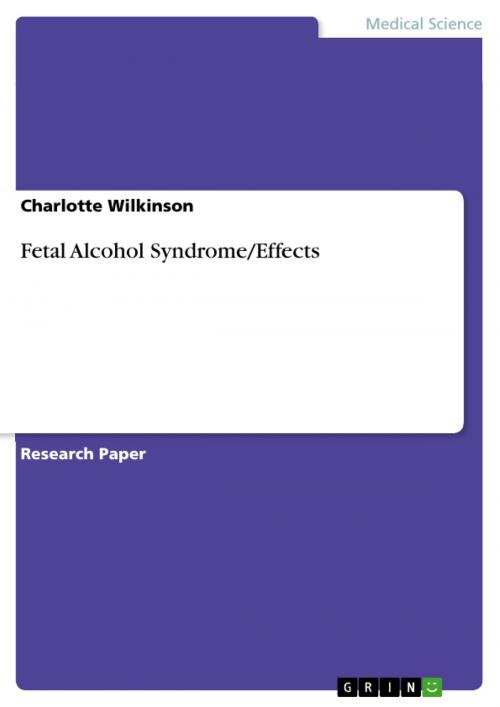| Author: | Charlotte Wilkinson | ISBN: | 9783640597345 |
| Publisher: | GRIN Publishing | Publication: | April 20, 2010 |
| Imprint: | GRIN Publishing | Language: | English |
| Author: | Charlotte Wilkinson |
| ISBN: | 9783640597345 |
| Publisher: | GRIN Publishing |
| Publication: | April 20, 2010 |
| Imprint: | GRIN Publishing |
| Language: | English |
Research Paper (postgraduate) from the year 2009 in the subject Medicine - Pediatrics, grade: 96, , language: English, abstract: Fetal Alcohol Syndrome (FAS) is a part of Fetal Alcohol Spectrum Disorder, and is also referred to as Fetal Alcohol Effects. However, FAS is the clinical diagnosis term for any one on the spectrum. So for the purposes of this paper, it will be referred to as such. FAS is one of the leading causes of preventable birth defects and developmental delays (Graefe, 2003). It is a form of brain injury caused by alcohol usage by the mother during pregnancy, and is more prevalent in our world than many people are aware of. 9 out of every 1000 births are FAS births (Knowledge Network 2009), and as many as 1 in 4 births may have had alcohol exposure, but no noticeable effects. There is no association between paternal alcohol consumption and birth outcome (Saskatchewan Institute on Prevention of Handicaps, 2000). Contributing factors to the cause of FAS include malnutrition, other drug usage, already having a child with FAS, and having a history of substance abuse. It is not genetic or inherited (Graefe, 2003).
Research Paper (postgraduate) from the year 2009 in the subject Medicine - Pediatrics, grade: 96, , language: English, abstract: Fetal Alcohol Syndrome (FAS) is a part of Fetal Alcohol Spectrum Disorder, and is also referred to as Fetal Alcohol Effects. However, FAS is the clinical diagnosis term for any one on the spectrum. So for the purposes of this paper, it will be referred to as such. FAS is one of the leading causes of preventable birth defects and developmental delays (Graefe, 2003). It is a form of brain injury caused by alcohol usage by the mother during pregnancy, and is more prevalent in our world than many people are aware of. 9 out of every 1000 births are FAS births (Knowledge Network 2009), and as many as 1 in 4 births may have had alcohol exposure, but no noticeable effects. There is no association between paternal alcohol consumption and birth outcome (Saskatchewan Institute on Prevention of Handicaps, 2000). Contributing factors to the cause of FAS include malnutrition, other drug usage, already having a child with FAS, and having a history of substance abuse. It is not genetic or inherited (Graefe, 2003).















